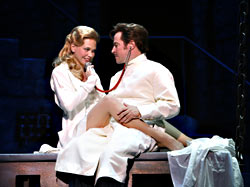On August 7, the morning after the final dress rehearsal of Young Frankenstein, I ran into a friend who’d been there. His report, in brief: The first act is two hours long, the songs stop the show (not in a good way); the second act is perfect and hilarious; the sets are amazing; Megan Mullally is fantastic.
That also sums up my opening-night impression, with one important difference. Mel Brooks et al. did tinker in the intervening weeks (a Wikipedia article reveals that one number was cut) and Act 1, though still generous, is well-oiled. What puts a little drag on the show is not the songs, but the painstaking, almost archival re-creation of gags and entire sequences from the original movie with barely as much as a comma altered. Not that they could get away with cutting anything (the revolving bookcase? the neighing horses?) without rousing a torch-bearing mob of angry playgoers. But can jokes that are hilarious when delivered deadpan, and flawlessly timed, on the screen still work when they have to be sold to the back of the top balcony? Not necessarily. “What knockers!” and the bit with Igor’s moving hump, for example, fall a bit flat.
Unlike Brooks’ The Producers, which was translated unselfconsciously to the stage, Frankenstein plays the conversion itself, the insertion of songs into the movie script, as part of the joke. You can imagine the first brainstorming session, with Brooks, book writer Thomas Meehan, and director/choreographer Susan Stroman giggling over the notion of making full production numbers out of punch lines (“Roll, roll, roll in ze hay,” “He vass my boyfriend!”). The film’s only song-and-dance number, “Puttin’ On the Ritz,” is expanded, ecstatically, beyond its one immortal gag into a full-dress showstopper (in a good way); in a wacky echo of The Producers‘ “Little Old Lady Land” walker ballet, the tuxedoed chorus line tap-dances in Frankenstein boots with 10-inch soles.
Brooks also wrote the music and lyrics. You’d have to have an enormous schwanzstucker to dare to quote “Ritz,” one of Irving Berlin’s finest songs, alongside your own, and I’ll give Brooks credit for that. Still, it’s the only tune in YF that provides a significant lift. The Producers made a gazillion dollars without a single song that had life outside the show, and it looks like YF‘s Eastern Europe–flavored score may do the same. You can’t fault the songs for being old-fashioned Broadway pastiche, but you can fault them for not even sticking in your head.
The casting is uncommonly deep, with all the leads demonstrating a similar old-school combo of versatility, chops, and star power. As Frederick, Roger Bart—who stole The Producers playing the swishy, serpentine Carmen Ghia—is equally excellent as comic and straight man, with a sort of easy, virile likability that’s almost in the Howard Keel/John Raitt leading-man mold. Shuler Hensley’s performance as Frankenstein’s monster stretches even more widely from slapstick to (once the monster masters speech) a dash of grandeur and pathos. There are two consummate clowns, Christopher Fitzgerald (as Igor) and Fred Applegate; and anyone who thinks a Barbie doll presents an unrealistic image of female body proportions hasn’t seen Sutton Foster (lab assistant Inga), a tall bombshell ingenue with legs that reach into next Tuesday.
The two cast members best known for TV work also have this same theater-filling presence: “SCTV”‘s Andrea Martin (castle housekeeper Frau Blücher) and “Will and Grace” glamour puss Mullally—maybe a tad under-used (it was one of her songs that was cut), as if she were just being dangled before her vociferous gay fans and snatched away. As another friend pointed out, she seems to be conscientiously not falling back on playing Karen—even though the role, Frederick’s voracious diva fiancée Elizabeth, essentially is Karen.
The whole show, in fact, comes off with a similar winning feeling of not resting on its laurels, of taking nothing for granted, of working no less hard to win your affection than if everyone and everything involved were unknown quantities. Like the gorgeously shot movie, the production is beautiful, from William Ivey Long’s operetta-on-growth-hormone costumes to the projections and visual effects. But despite the lavishness (and oy gevalt, there’s some gelt on that stage), and despite the fact that the project from the start risked seeming like a too-cynical effort to breed a new cash cow by cloning The Producers‘ formula, there’s a soul here, a desire to entertain and wow that seems to stem above all from heartfelt generosity. Even the verbatim borrowings from the film seem less like calculated easy laughs than like, say, your mom cooking your favorite meal for your birthday.







